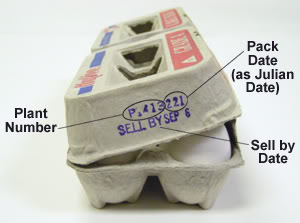How fresh are your eggs?
The freshness of an egg is not only determined by the date when the egg was laid, but also by the way the egg has been stored. Proper handling and storage is perhaps the most important factor in determining freshness.
If a freshly laid egg is left at room temperature for a full day, it will not be as fresh as a week old egg that has been refrigerated between 33° and 40°F. from the time it was laid.
According to the U.S. Dept. of Agriculture (USDA):
Many eggs reach stores only a few days after the hen lays them. Egg cartons with the USDA grade shield on them, indicating they came from a USDA-inspected plant, must display the ‘pack date’ (the day that the eggs were washed, graded, and placed in the carton). The number is a three-digit code that represents the consecutive day of the year (the ‘Julian Date’) starting with January 1 as 001 and ending with December 31 as 365.

Though not required, most egg cartons also contain a “sell by” date beyond which they should not be sold. In USDA-inspected plants (indicated by the USDA shield on the package), this date can’t exceed 30 days beyond the pack date which is within USDA regulations. Always purchase eggs before their “sell by” date.
How long are eggs good after the sell date?
Refrigerated raw shell eggs will keep without significant quality loss for about 4 to 5 weeks beyond the pack date or about 3 weeks after you bring them home.
A general rule to follow is that any egg that looks or smells odd should not be used. If an egg is bad you will know it. Just smell the egg! Just crack each egg in a small bowl, smell it – your nose will tell you!
How to test if an egg is fresh
First Method:
Fill a deep bowl with water and carefully lower the egg into the water. A very fresh egg will immediately sink to the bottom and lie flat on its side. This is because the air cell within the egg is very small. The egg should also fee quite heavy.
As the egg starts to lose it freshness and more air enters the egg, it will begin to float and stand upright. The smaller end will lie on the bottom of the bowl, while the broader end will point towards the surface. The egg will still be good enough to consume.
However, if the egg fully floats in the water and does not touch the bottom of the bowl at all, it should be discarded, as it will most likely be bad.
Second Method:
Test the eggs freshness by breaking the egg onto a flat plate, not into a bowl. The yolk of a very fresh egg will have a round and compact appearance and it will sit positioned quite high up in the middle of the egg. The white that surrounds it will be thick and stays close to the yolk.
A less fresh egg will contain a flatter yolk, that may bread easily and a thinner white that spreads quite far over the plate.
How to store eggs?
Buy refrigerated eggs and store them in the refrigerator as soon as your get home. However, even under refrigeration, eggs slowly lose carbon dioxide, which enlarges the size of the air cell and causes the yolk to flatten and the white to spread.
Resources
http://whatscookingamerica.net/Q-A/EggsSell.htm
